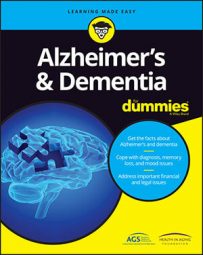Because so many different conditions can produce symptoms typically associated with dementia, the doctor must rule out all other potential causes and ensure that your loved one's symptoms fit the criteria for dementia (including Alzheimer's disease) before arriving at a diagnosis:
- Depression: Severe clinical depression may be mistaken for dementia, which is why such cognitive problems in depressed patients are referred to as pseudo-dementia. People who are severely depressed can experience problems in thinking or memory, including difficulty concentrating, recalling information, and keeping track of dates or time, or they may complain that they can't stay focused on a task. They may report difficulty making decisions or starting or completing projects, and they may appear apathetic.
However, a person can have both depression and dementia at the same time. A good medical and neuropsychological evaluation is needed to determine if your loved one is experiencing one or possibly both of these conditions.
If your loved one is suffering from depression and not dementia, you can expect his cognitive problems to respond to proper treatment for depression. If he is treated for depression and shows an improved mood but no improvement in thinking or memory, a diagnosis of dementia (possibly AD) may be appropriate. The bottom line is that your healthcare practitioner must assess whether your loved one is depressed before making a diagnosis of dementia.
- Delirium: Another condition that can cause dementia-like symptoms is delirium. Delirium is suspected when someone shows a fluctuating change in alertness — particularly problems focusing, maintaining, or shifting attention — that usually starts within hours or days of another medical condition. This is unlike dementia that develops over months to years. In delirium, speech may be incoherent, and the individual may have problems staying awake or become agitated and restless in a fluctuating manner. Disorientation to person, place, or time; mood shifts; or hallucinations may also come and go.
Delirium is often caused by an illness (for example, an infection, such as a urinary tract infection or pneumonia, congestive heart failure, a metabolic disorder, such as dehydration, low sodium, or kidney problems; physical trauma like a head injury, or cardiac problems, such as a heart attack or congestive heart failure). Many drugs commonly used by older adults to treat pain, infection, inflammatory diseases, gastrointestinal problems, and more can also cause delirium. Delirium is a reversible condition if the underlying cause is properly diagnosed and treated.
Dementia or delirium can also result from alcohol or drug abuse, so you need to inform the healthcare practitioner if your loved one has a history of drug or alcohol problems, including abuse of over-the-counter medications or prescription drugs.
As with depression, a person can have both delirium and dementia simultaneously. People who become delirious don't necessarily have dementia, but people with dementia are more susceptible to delirium than those without it.

